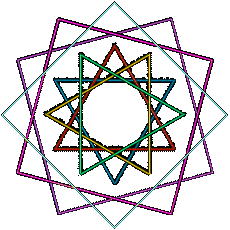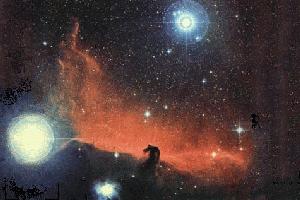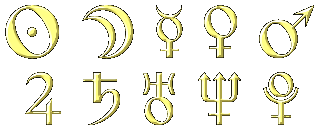|
| |||||
|
Astrology
The Magic of the Stars
Uncountable sources of cosmic radiation,
universal forces of nature mixed with local modifiers - all influencing our personality, outlook, and even our fate. What's your sign, baby? Is there a favorable moon in your seventh house?
Are you a Venus Rising? Are you the flighty artistic type, or a natural born leader? For uncounted millennia, astrology has been used, in part, to help foretell a person's future.
| ||||||
|
Cosmic Radiation  Ages ago, Astronomy and Astrology were considered to be the same science.
During the Renaissance Era, only those who would by modern standards rank as expert Astrologers, were allowed to be physicians.
Today, skeptics leap at the chance to scoff at Astrology - but take for example that most earthquakes do happen around full moons, new moons; and especially immediately after most eclipses.
It seems to be all about gravity - and that's all Astrology is, the study of gravity and cosmic radiation; and how it affects us.
Ages ago, Astronomy and Astrology were considered to be the same science.
During the Renaissance Era, only those who would by modern standards rank as expert Astrologers, were allowed to be physicians.
Today, skeptics leap at the chance to scoff at Astrology - but take for example that most earthquakes do happen around full moons, new moons; and especially immediately after most eclipses.
It seems to be all about gravity - and that's all Astrology is, the study of gravity and cosmic radiation; and how it affects us.
Compared to what's going on out in the universe - from black holes and pulsars, to supernovae and anything else we haven't dreamed of yet - we are but amoebae, in a shallow puddle of vinegar. Though we may not like to think of ourselves as such, we are all sensitive and fragile; relatively simple, biochemical and electrical creatures. These "mysterious" and "cosmic" forces are really entirely physical in nature. If we had the equipment to measure them, we would see that they are everywhere - and in everything. Perhaps by somehow affecting our brainwave patterns, they touch on aspects of our lives and personality that established science has yet to discover entirely on its own - and therefore, is painfully reluctant to admit even exists. But they're working on it. Perhaps it is finally time for astrology and astronomy to compare notes - realize that they are merely different aspects or branches of the same science; and neither one can fully exist without the other. It is important to remember that there is no known origin for either discipline. Some believe that our modern version of Astrology is but a tiny part of what little is left to us from the perhaps much more advanced ancient civilization of Atlantis - if they did not have space shuttles or striped toothpaste, maybe they were more in touch with nature, and spirituality. Some think of it as if there were a giant clock surrounding our solar system, marked out by constellations - groupings of stars recognized for eons, and generally dividing up the circumference of the sky into twelve equal sections (more or less: Astronomy and Astrology do not measure the signs of the zodiac in the same way). Even going only so far as our visual spectrum is concerned, each of these stars acts like a laser beam, sending us every imaginable, and unimaginable, kind of energy and radiation; each with its own unique blend and specific complex bandwidth signature - sometimes fluctuating however, depending on the star's own personal and customized circumstance. Thus, if some cosmic rays can affect our DNA, even mutate organisms into entirely different species, it is certainly within the realm of possibility that others may change the way we think and feel. More simply put: like goldfish in a pond, we act differently when it rains.
Expanding on this line of thought: in our local solar system, Planets travel and rotate in predictable patterns, even acting as giant mirrors for our own sun, while also reflecting and refracting the energy of other planets; as well as the energy coming towards us from outside the solar system - thus, it can tend to be a complex calculation, with many fluctuating variables. Early astrologers can harly be slighted for inventing such a science without the benefit of computers - but they were beginning with the basics. Besides the sun, the greatest influence on our shiny blue fishbowl is the moon - specifically, what phase it's in: full, new, or especially an eclipse. We tend to become accustomed to these regular waves, and are particularly identified and acclimated to how the sky was when we first physically popped out into this world, and even, somewhat, to the moment we were originally conceived. These "vibes" may also pertain to inanimate objects. Some schools of thought, however, insist that nothing is purely inanimate - not even rocks, or for that matter, computers.
As far as astrologers are concerned, however - there has been significant, dramatic, noted phenomena. When planets go into retrograde, they emit signals we're not attuned to - like a dischordant symphony, if suddenly one or more instruments began playing their pieces backwards for a few minutes. Retrogrades can last for weeks, or even months - and tend to be bad times for making major decisions. Everybody's a little off once in a while. Another major player in a person's personality, besides what general constellation, or sign, the Sun happens to be in, is what sign was rising in the east on the moment we were born - also, if there was a particularly favorable planet in that sign, or even relatively nearby. Certain geometric alignments of various Planets, especially including the Sun and Moon, can be very influential in our lives. We may be particularly identified with these values because they were in the sky for the longest time in our first moments of life - and then, of course, they set; but twelve hours later, they returned - and we thus became naturally acclimated to that specific cycle of radiation emanating from the sky, on this planet in which we happen to live. Eventually, the Planets drifted away from that original sky position, primary to the individual - but sometimes they return, with varrying degrees of precision. Other dynamics come into play as well, and everyone is affected to one degree or another. This is a common lot for all of us - and naturally, some alignments are more extreme than others. When these constellations and/or planets, etc, return to their places of origin, we feel the most "at home" with ourselves, and are better acclimated to daliy life. In contrast, when stars and planets configure in unfamiliar relationships, we may feel "out of sync." Thus, people born during a Mercury Retrograde may be normally restless - unless Mercury happens to be in Retrograde, which is relatively rare. For example: a Capricorn with a Leo Rising, and also a Full Moon Rising is a rare combination. Capricorn, the Cardinal Earth Sign, when augmented by Leo's Fixed Fire, may combine to make a generally grounded but notoriously stubborn person. While skeptics may argue that this description is vague enough to apply to anyone, it is not always the first thing you might think about when describing someone. Delving further: leadership abilities are noted to be strong with both signs, so they may combine to make a relative perfectionist. The full moon aspect, for the first 12 hours of life, may also tend to make a "night person" (also full moons only ever rise in the early evening, as the sun sets). Such a person might function best out of the limelight, but with "all your ducks in a row," so to speak. Signs where there are not very many bright stars, but a wealth of interesting deep sky objects (like galaxies, nebulae or assorted star clusters), may pertain less to the emanating directly from the Milky Way, or the rest of the Galaxy (one imagines their affect would be relatively small), and more about local dynamics, further radiations being somewhat obscured. Imagine someone born in Virgo, at dawn, receiving the most possible ammount of sunlight, (effectively washing out the greatest possible ammount of stellar radiation). Twelve hours later, it has become night, and the infant has already become acclimated to the blinding sun. Now imagine the almost entirely unique circumstance of having no planets overhead. This person may grow up to have almost complete immunity to anything his or her horoscope would suggest - although it might particularly interesting with a New Moon thrown in there somewhere. |
| Pisces February 19 - March 20 |
Aries March 21 - April 20  |
Taurus April 21 - May 21 |
|||||
| Aquarius January 21 - February 18 |
 |
 |
Gemini May 22 - June 21 |
||||
 |
 |
 |
|||||
 |
Capricorn December 22 - January 20 |
Cancer June 22 - July 22 |
 |
||||
 |
 |
||||||
| Sagittarius November 23 - December 21 |
 |

Libra September 23 - October 23 |
 |
Leo July 23 - August 23 |
|||
| Scorpio October 24 - November 22 | Virgo August 24 - September 22 |
||||||
|
|
|
| ||||||||||||||||||||||||||||||||
 |
|

|
|
|
| ||||||||||||||||||||||||||||||
 | Sun |
 | Moon |
 | Mercury |
 | Venus |
 | Mars |
 | Jupiter |
 | Saturn |
 | Uranus |
 | Neptune |
 | Pluto |
Supplements
|
|
| Paranormal | ||
|
The Bermuda Triangle �
Ley Lines Psychics � Ghosts � Angels Astrology � Prophecy
| ||

|

 What specific effect these bizarre forces of nature have on our brainwaves,
mainstream science would not venture a guess, having no instrumentation or method by which to measure.
A few scattered studies have been undertaken, but none with the intention of finding anything that wasn't already "known"
(astrologers are at best side show acts, and any widespread belief can be attributred to mass hysteria).
Despite this condemnation from on high, billions worldwide have more than a passing interest in the phenomenon.
Many swear by it - even citing specific examples that changed their lives for the better when they listened, or worse when they didn't.
Beyond the realm of chance, a person knows when a personal connection has been made.
One is left with the question: is there really a pre-ordained destiny, or are we just talking about the weather?
If only we could predict when these changes will occur.
What specific effect these bizarre forces of nature have on our brainwaves,
mainstream science would not venture a guess, having no instrumentation or method by which to measure.
A few scattered studies have been undertaken, but none with the intention of finding anything that wasn't already "known"
(astrologers are at best side show acts, and any widespread belief can be attributred to mass hysteria).
Despite this condemnation from on high, billions worldwide have more than a passing interest in the phenomenon.
Many swear by it - even citing specific examples that changed their lives for the better when they listened, or worse when they didn't.
Beyond the realm of chance, a person knows when a personal connection has been made.
One is left with the question: is there really a pre-ordained destiny, or are we just talking about the weather?
If only we could predict when these changes will occur.
 All would seem to be well in an orderly universe
- simply measure the stars, determine what they mean, and win big in the stock market
- but not everything is as it seems, or goes as planned.
Perhaps there is more to this complex puzzle than we have yet been able to identify.
In the world of science, everything happens for a reason, and few things are wholly independant.
Still, the position of mainstream science is that we live in a chaotic universe - but only so far as Astrology is concerned.
All would seem to be well in an orderly universe
- simply measure the stars, determine what they mean, and win big in the stock market
- but not everything is as it seems, or goes as planned.
Perhaps there is more to this complex puzzle than we have yet been able to identify.
In the world of science, everything happens for a reason, and few things are wholly independant.
Still, the position of mainstream science is that we live in a chaotic universe - but only so far as Astrology is concerned.